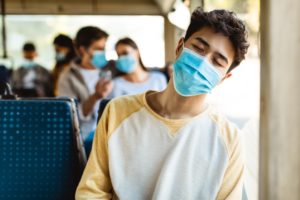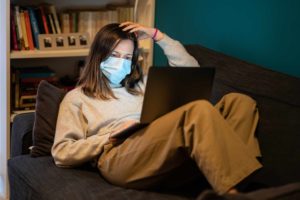COVID-19 Vaccine: Sleep, Sickness, and Immunity
This article is for informational purposes only. Consult your local medical authority for advice. For up-to-date information on the COVID-19 outbreak and vaccine, visit CDC.gov.
COVID-19 vaccines and boosters are now widely available for anyone who is at least 6 months old. The Centers for Disease Control and Prevention (CDC) recommends a primary vaccine series followed by at least one booster shot.
Staying up-to-date on the COVID-19 vaccine recommendations for your age and risk category reduces your risk for contracting COVID-19 and spreading it to others. It also significantly lowers your risk for serious illness and death if you do develop a COVID-19 infection.
What COVID-19 Vaccines Are Available?
There are currently four different vaccines available in the United States. They are most commonly referred to by the name of the company that developed them:
- Pfizer-BioNTech (Comirnaty)
- Moderna (Spikevax)
- Novavax
- Johnson & Johnson (J&J/Janssen)
Each of these vaccines has been approved or authorized by the U.S. Food and Drug Administration after being rigorously evaluated and tested for safety and effectiveness. Differences between these vaccines include the type of vaccine, who can get it, and how many doses are required.
| Vaccine Name | Type of Vaccine | Who Can Get This Vaccine? | Timing of Initial Doses | Type and Timing of Booster Shot |
|---|---|---|---|---|
| Pfizer-BioNTech (Comirnaty) | mRNA | 6 months and older | 2 shots given 3-8 weeks apart | Pfizer-BioNTech or Moderna at least 2 months later |
| Moderna (Spikevax) | mRNA | 6 months and older | 2 shots given 4-8 weeks apart | Pfizer-BioNTech or Moderna at least 2 months later |
| Novavax | Protein subunit vaccine | 12 years and older | 2 shots given 3-8 weeks apart | Pfizer-BioNTech or Moderna at least 2 months later |
| Johnson & Johnson (J&J/Janssen) | Viral vector | 18 years and older | 1 shot | Pfizer-BioNTech, Moderna, or J&J at least 2 months later |
All four of these vaccines are administered through injection into the muscle of the upper arm.
They have been tested in clinical trials involving tens of thousands of adults and adolescents. In those studies, people taking the vaccines were significantly less likely to get infected, develop severe symptoms, require hospitalization, or die from COVID-19. Compared with placebo, the vaccines offered considerable protection with minimal side effects.
Among the four available vaccines, there are three different types. The type of vaccine is based on how the virus works to create an immune response in the body that protects against future illness from COVID-19.
- mRNA vaccines: The Pfizer and Moderna vaccines are mRNA vaccines. This type of vaccine utilizes a harmless, synthetic fragment of genetic material from the virus to train the immune system to recognize and attack the virus itself.
- Protein subunit vaccine: The Novavax vaccine is a protein subunit vaccine. This type of vaccine contains pieces of the virus called spike proteins along with a substance called an adjuvant that helps the immune system recognize and fight off spike protein if it encounters it in the future.
- Viral vector vaccine: The Johnson & Johnson/Janssen vaccine is a viral vector vaccine. It incorporates a genetic fragment of SARS-CoV-2 into a deactivated common cold virus. This enables the immune system to better identify and attack the coronavirus.
How Can I Get a COVID-19 Vaccine?
To learn about where to get vaccinated in your area, contact your doctor’s office or a local pharmacy and ask if they offer COVID-19 vaccines or if they can refer you.
Additionally, a Vaccine Finder website has been established in cooperation with the CDC to provide information about vaccine availability in different states. Vaccines may be offered in various settings, including health clinics, medical offices, hospitals, pharmacies, and mass vaccination sites.
You generally cannot choose which brand of vaccine that you will receive. However, many sites have been reporting the vaccine type they are administering, so if you have a preferred vaccine, you may be able to seek it out. If you have questions or concerns about receiving a specific vaccine, it is best to discuss them with your doctor.

Are COVID-19 Vaccines Safe?
Studies in tens of thousands of people in multiple countries have shown that COVID-19 vaccines are safe, and this safety record has been reinforced since December 2020 with over 670 million doses having been administered in the United States.
Some of the most common side effects are pain or swelling in the arm where you receive the shot, fever, chills, headache, and fatigue. These side effects normally go away within a few days and pose no ongoing problems after vaccination.
For all vaccines, there have been extremely rare reports of severe allergic reactions. You will normally be asked to stay at the vaccination site for around 15 minutes after receiving the shot to be monitored for any adverse response. During this time, any signs of allergic reaction, such as facial swelling, rash, difficulty breathing, or dizziness should be reported to medical professionals immediately.
The Johnson & Johnson vaccine has been associated with an increased risk of a condition called thrombosis with thrombocytopenia syndrome (TTS). The side effect is very rare and has affected approximately 4 people out of every 1 million who have received this vaccine. The FDA and CDC have concluded that the benefits of this vaccine continue to outweigh its risks. None of the other vaccines have been linked to TTS.
Pre-Vaccination Precautions
Although the COVID-19 vaccines are generally safe, there are some precautions to consider. Talk to your doctor before getting vaccinated if you:
- Have known allergies
- Currently have COVID-19
- Have symptoms of COVID-19 or were recently exposed to an infected person
- Have a bleeding disorder or take a blood thinner
- Are immunocompromised or take medicine that affects your immune system
- Are pregnant or breastfeeding
- Have inflammation of the heart muscle or the lining around the heart
These factors do not disqualify a person from getting vaccinated, but reviewing them with a doctor can help ensure safe vaccine administration.
When you arrive at an appointment for vaccination, you can expect to receive a document that explains the potential side effects. As you review this form, you can bring up any questions or concerns with medical staff at the vaccine site.
Who Shouldn’t Get the COVID-19 Vaccine?
There are only two situations in which experts recommend against receiving specific COVID-19 vaccines. Neither of these necessarily make a person ineligible for COVID-19 vaccination altogether, but they will affect the type of vaccine they receive.
- Known allergy to a COVID-19 vaccine: If you have previously had a severe allergic reaction to a COVID-19 vaccine or one of its ingredients, you should not receive another dose of that vaccine. But you might be able to receive a different type. For example, if you had a severe allergic reaction to one of the mRNA vaccines – Pfizer or Moderna – you may still be able to receive the Novavax or the Johnson & Johnson vaccine.
- History of TTS or Guillain-Barre syndrome: If you previously developed thrombosis with thrombocytopenia syndrome or an immune condition called Guillain-Barre syndrome after receiving the Johnson & Johnson vaccine or another similar vaccine, you should not receive the Johnson & Johnson vaccine. However, you may be able to receive one of the other vaccines.
How To Stay Safe After Vaccination
Vaccines do not offer immediate protection against COVID-19. It takes time for your body’s immune system to develop a response, and during that time, you can still be susceptible to COVID-19 infection. Additionally, researchers and public health officials have found that protection from the vaccine decreases over time, which is why updated booster shots are recommended.
People who have been fully vaccinated and receive all recommended booster shots have strong protection against severe illness, hospitalization, and death from the virus. They also have some protection against infection. Nevertheless, vaccinated people can still contract COVID-19 and are able to spread the virus to others.
For these reasons, it is important to maintain basic precautions against COVID-19 after vaccination to enhance protection for yourself and others. These measures include:
- Washing your hands frequently
- Improving ventilation in indoor spaces and spending time outside
- Wearing a mask for 10 days if you have been exposed to someone with COVID-19
- Getting tested if you develop symptoms of COVID-19
- Staying home and avoiding contact with others if you have suspected or confirmed COVID-19
If you live in a community with high transmission of COVID-19, you may need to take additional precautions, such as masking anytime you are in a crowded space and social distancing.
Knowing the Facts About the COVID-19 Vaccine
Even though large research studies have shown the safety of COVID-19 vaccines, some myths about them continue to spread online. Knowing the facts can help combat those inaccurate claims:
- COVID-19 vaccines do not give you the virus: The vaccines incorporate only small fragments of material taken from the COVID-19 virus, but these fragments are unable to transmit the virus. In fact, by teaching your immune system to recognize the virus, the vaccines offer protection against COVID-19.
- COVID-19 vaccines do not cause new variants: New COVID-19 variants emerge when the virus gradually mutates over time as it spreads. Genetic mutations in viruses are typical and expected. Vaccination can actually help reduce the number of new variants that emerge by controlling the spread of the virus.
- COVID-19 vaccines do not affect fertility: No studies have found there to be any effect of these or any other vaccines on fertility in people of any sex. COVID-19 vaccines have also been shown to be safe in people who are pregnant or breastfeeding. Research indicates that vaccination during pregnancy or while breastfeeding may even provide some protection to infants .
Sleep and the COVID-19 Vaccine
Getting a sufficient amount of quality sleep is important for your immune system. Early research indicates that receiving a COVID vaccine the morning after a good night’s sleep may improve its effectiveness.
In contrast, research looking at another type of vaccine, one for hepatitis B, showed that people who sleep less than seven hours per night had reduced immune system responses to the vaccine and were considerably more likely to remain unprotected despite vaccination.Additionally, people with sleep disorders may wonder how the vaccine may impact their ongoing treatments, or whether it could exacerbate their symptoms. The evidence is clear that the benefits of COVID-19 vaccination outweigh the risks for people with sleep disorders. Vaccination is especially important in people with sleep apnea, as sleep apnea is associated with worse outcomes in people who get COVID-19.
Does the COVID-19 Vaccine Make You Sleep More?
Sleepiness and fatigue are among the most common side effects of the COVID-19 vaccine. You may find yourself needing more sleep after vaccination. However, if a sore arm or fever are causing discomfort, you might experience disrupted sleep. Either way, these side effects are temporary and normal.
COVID-19 vaccines are designed to cause an immune response that trains your immune system to fight the virus effectively if it encounters it in the future. It is this immune response that causes the tiredness, sore arm, fever, and other side effects. Set aside extra time for rest and sleep if you develop side effects following your COVID-19 vaccine.
References
9 Sources
-
National Center for Immunization and Respiratory Diseases, Division of Viral Diseases. (2023, March 2). Stay up to date with COVID-19 vaccines including boosters. Centers for Disease Control and Prevention., Retrieved March 8, 2023, from
https://www.cdc.gov/covid/vaccines/stay-up-to-date.html -
National Center for Immunization and Respiratory Diseases, Division of Viral Diseases. (2023, March 7). Safety of COVID-19 vaccines. Centers for Disease Control and Prevention., Retrieved March 8, 2023, from
https://www.cdc.gov/coronavirus/2019-ncov/vaccines/safety/safety-of-vaccines.html -
National Center for Immunization and Respiratory Diseases, Division of Viral Diseases. (2023, March 7). Selected adverse events reported after COVID-19 vaccination. Centers for Disease Control and Prevention., Retrieved March 8, 2023, from
https://www.cdc.gov/coronavirus/2019-ncov/vaccines/safety/adverse-events.html -
Edwards, K. M., & Orenstein, W. A. (2023, February 7). COVID-19: Vaccines. In M. S. Hirsch (Ed.). UpToDate., Retrieved March 9, 2023, from
https://www.uptodate.com/contents/covid-19-vaccines -
Centers for Disease Control and Prevention (2022, November 10). COVID-19 vaccine effectiveness monthly update., Retrieved March 8, 2023, from
https://covid.cdc.gov/covid-data-tracker/#vaccine-effectiveness -
National Center for Immunization and Respiratory Diseases, Division of Viral Diseases. (2023, January 26). How to protect yourself and others. Centers for Disease Control and Prevention., Retrieved March 8, 2023, from
https://www.cdc.gov/covid/prevention/index.html -
National Center for Immunization and Respiratory Diseases, Division of Viral Diseases. (2022, October 20). COVID-19 vaccines while pregnant or breastfeeding. Centers for Disease Control and Prevention., Retrieved March 8, 2023, from
https://www.cdc.gov/covid/vaccines/pregnant-or-breastfeeding.html -
Rayatdoost, E., Rahmanian, M., Sanie, M. S., Rahmanian, J., Matin, S., Kalani, N., Kenarkoohi, A., Falahi, S., & Abdoli, A. (2022). Sufficient sleep, time of vaccination, and vaccine efficacy: A systematic review of the current evidence and a proposal for COVID-19 vaccination. The Yale Journal of Biology and Medicine, 95(2), 221–235.
https://pubmed.ncbi.nlm.nih.gov/35782481/ -
Prather, A., Hall, M., Fury, J. M., Ross, D. C., Muldoon, M. F., Cohen, S., Marsland, A. L. (2012). Sleep and antibody response to hepatitis B vaccination. Sleep, 35(8), 1063–1069.
https://pubmed.ncbi.nlm.nih.gov/22851802/





